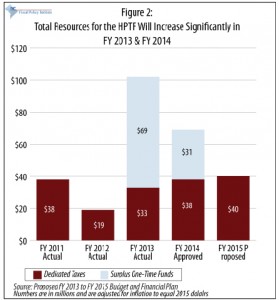Today, DCFPI will propose ways to strengthen the Housing Production Trust Fund (HPTF), when we testify at the budget hearing for the Department of Housing and Community Development. The HPTF, one of the city’s most important housing tools, helps build and preserve affordable housing. But it needs more funding, particularly to support housing suitable for families and to help tenants buy their buildings when a landlord has put it up for sale.
Not only are many residents finding it harder to afford to live in the District, but the success of other critical public investments depends on the stability that affordable housing provides. A child whose family is frequently moving or homeless will almost certainly face educational and health challenges. A resident with a chronic health problem will be able to treat their disease better and avoid costly emergency room visits if they have a stable home. And a resident can focus more on building skills to compete for a job if they aren’t preoccupied with figuring out where to sleep each night.
Here’s how the Housing Production Trust Fund can be strengthened to create more stable housing opportunities:
- The Trust Fund Needs an Increase in Regular Annual Funding. The HPTF receives dedicated taxes, which has generated $33 million to $40 million in recent years. That was supplemented in FY 2013 and FY 2014 with a substantial amount of one-time funds. (See Figure.) But the reliance on one-time funds highlights the limited capacity of the Housing Production Trust Fund under its current funding formula. DC should look to appropriate additional funds into the HPTF each year to achieve a goal of $100 million annually.
- Helping Families Home. On Wednesday, 20 community organizations, including DCFPI, released Helping Families Home: A Roadmap for the District that will put DC on a path to offering safe and decent shelter to families when they need it while also helping them quickly move from shelter to a stable home. Increasing the amount of funds available to the HPTF — and ensuring that a substantial portion is used to develop affordable housing that meets families’ needs — is an important part of reducing homelessness.
- Helping Tenants Buy Their Apartments. DHCD’s First Right Purchase program helps low- and moderate-income tenants exercise their right to purchase their building when it is put up for sale. It is one of the District’s key anti-displacement tools. Yet only 105 homes were preserved with First Right Purchase in 2012, in the midst of 5,000 rental units put up for sale. Increasing support of this program, using the Trust Fund, along with making some efficiency improvements, will help more residents stay as their neighborhood redevelops.

